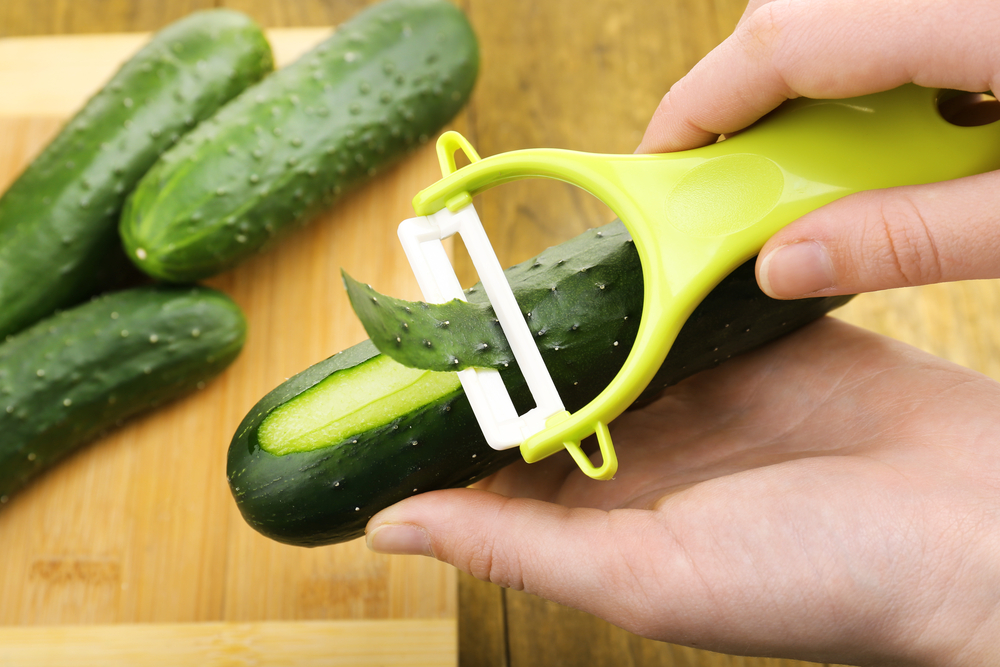10 Unknown Side Effects of Cucumber to Know About
Understand the hidden side effects of cucumbers like bloating, skin irritation, abdominal discomfort, and allergic reactions to avoid visiting an emergency room.

Cucumbers can be a great, refreshing twist to your diet. They might just be right for hot summers since they are loaded with water, but there are also side effects of cucumber that are unknown to many. This humble green fruit is more than just a cool and crisp snack; it has a plethora of health benefits, which you may enjoy only if you are aware of cucumber’s side effects.
With their high water content, cucumbers are excellent for hydration, helping to quench your thirst. Not to mention, they are packed with essential vitamins and minerals, such as vitamin K, vitamin C, and potassium, which support a healthy immune system, promote radiant skin, and aid in maintaining optimal blood pressure (1).
But before you embark on a cucumber frenzy, let's peel back the layers and explore the flip side. Yes, even the cucumber has its quirks! While it's rare, some individuals may experience digestive discomfort, such as bloating or gas, when consuming cucumbers. Additionally, certain people may be prone to skin reactions, such as itching or redness, due to an allergy to cucurbitacins, compounds found in cucumbers (2).
As you embark on this delightful cucumber crunch, it's essential to embrace the benefits it offers while being mindful of any potential side effects. Also, remember to listen to your body and make informed choices for a well-rounded and balanced approach to your diet.
10 Side Effects Of Cucumber You Need to Know About
Cucumbers are everyone's favorite when it comes to weight loss and adding them to salads. This may become the best part of your hummus plate or go perfectly with your guacamole. However, recent research has shown the side effects of cucumber, which include itching, rashes, and tummy pain. What’s more? Continue reading.
1. May Cause Digestive Discomfort
One of the most common side effects of cucumber is gastrointestinal discomfort. Cucumbers are widely known for their hydrating properties and abundant fiber content, yet some individuals may encounter stomach discomfort following their consumption. Our contributor Corrigan Duffy, Chef and food blogger explains the reasons for discomfort, saying, “Digestive discomfort from cucumbers can be triggered by factors like excessive consumption, improper preparation, or individual sensitivities to certain compounds in cucumbers.” The considerable fiber content in cucumbers, especially in their skin, can potentially lead to gastrointestinal problems like acidity, bloating, and diarrhea (3).
The fiber content of cucumbers may raise concerns, particularly for individuals with sensitive digestive systems or those susceptible to gastrointestinal conditions like irritable bowel syndrome (IBS) (4).
To mitigate these digestive issues, it is recommended to moderate your cucumber intake and observe how your body responds. Some people may find that peeling the cucumber or removing the seeds helps alleviate symptoms, as these parts can be harder to digest. Additionally, incorporating cucumbers into meals alongside other easily digestible foods or cooking them lightly may also help reduce digestive distress.
2. May Cause Allergic Reactions

Although rare, some people may develop allergic reactions to cucumbers. This can manifest as itching, swelling, hives, or even difficulty breathing. Allergies to cucumbers are often due to a protein called chitinase (5). In the case of any previously known allergies to fruits such as melons or zucchini, you may be at a higher risk of experiencing a cucumber allergy as well.
Cucumber allergies typically fall under the category of oral allergy syndrome (OAS), also known as pollen-food syndrome. OAS occurs when proteins in certain foods, such as cucumbers, resemble proteins found in pollen. If you are allergic to certain pollen, such as ragweed or birch pollen, your immune system may mistake cucumber proteins for pollen proteins and trigger an allergic reaction (6).
The severity of allergies varies from mild swelling in the mouth or throat to severe symptoms such as anaphylaxis. If you suspect you have a cucumber allergy or experience any concerning symptoms after consuming cucumbers, it is crucial to seek medical attention promptly.
3. Exposure to Pesticide Toxicity
When cucumbers are consumed without proper washing or if non-organic varieties are chosen, there is a risk of ingesting pesticide residues. Pesticide residues can be present on the skin or even penetrate into the flesh of the cucumber. These residues can vary depending on the specific pesticides used, farming practices, and regulations in different regions (7).
When the human body is exposed to pesticides for a prolonged period, this may lead to severe chronic health issues. This may range from the likelihood of specific cancers to genetic modifications, hormonal imbalances, and disruptions in reproductive systems. Hence, to avoid this risk, it is best to opt for organic ones and consume them after peeling the skin of the cucumber.
4. May Cause Kidney Problems
Cucumbers have a diuretic effect, meaning they can increase urine production. While this can be beneficial for flushing out toxins and promoting kidney health, excessive consumption of cucumber juice, particularly in the evening, may lead to frequent urination (8).
The main reason why cucumbers have diuretic properties is because they contain a significant amount of water and specific compounds, including caffeic acid and potassium. These compounds have a mild diuretic effect, stimulating the kidneys to produce and eliminate more urine (8).
5. May Lead to an Imbalance of Body Electrolytes

The high water content of cucumbers makes them a refreshing option in salads. While water is surely essential for overall body fluids, what is more important is electrolyte balance. Low sodium levels in cucumber juice, when consumed daily, may lead to an imbalance of body electrolytes (9).
For individuals following a low-sodium diet or those with specific medical conditions requiring sodium restriction, excessive pickled cucumber consumption can disrupt electrolyte balance. Inadequate sodium intake can hinder fluid retention and the proper concentration of electrolytes, leading to symptoms like muscle cramps, dizziness, weakness, and fatigue (10).
Hence, to prevent this, one may consume a well-balanced diet. If you're on a low-sodium diet, it's important to monitor your cucumber intake and incorporate other sources of electrolytes, such as potassium-rich foods like bananas or avocados, to ensure a healthy balance.
6. May Cause Blood Clotting
One cup of cucumber contains your daily dose of vitamin K. Since cucumbers are rich in vitamin K, eating too many of them may alter the blood coagulation process (11).
Consuming high amounts of vitamin K can potentially interfere with the effectiveness of certain blood-thinning medications, such as warfarin (a blood thinner for heart patients), which are prescribed to individuals at risk of excessive blood clotting (12).
7. May Increase Photosensitivity
Some individuals may experience heightened photosensitivity or sunburn-like symptoms after consuming large quantities of cucumber. This reaction is more likely to occur if you have a condition called vitiligo or if you are taking medications that increase photosensitivity (13).
Cucumber contains certain compounds called psoralens, which can make the skin more sensitive to sunlight. Psoralens are known to react with UV radiation and can trigger skin reactions like sunburn or rashes in susceptible individuals (13). For people who suffer from PMLE or are taking medications like certain antibiotics, diuretics, or nonsteroidal anti-inflammatory drugs (NSAIDs) that increase photosensitivity, consuming large amounts of cucumber may exacerbate these effects.
8. May Increase the Formation of Kidney Stones

Excessive intake of high-oxalate foods, including cucumbers that come under the Cucurbitaceae family, and contain a moderate amount of oxalates, can potentially contribute to the formation of kidney stones or worsen existing kidney stone conditions in certain individuals (14).
It is possible for oxalates to mix with calcium to create crystals, which can build up and cause kidney stones to form. Consuming a lot of high-oxalate foods like cucumber may increase your chance of developing kidney stones or exacerbate your current condition if you have a history of them or if your doctor has instructed you to reduce your oxalate intake (15).
9. May Cause Discomfort During the Pregnancy
While it is considered completely safe to consume cucumber during pregnancy, there are a few things to take care of. One is the possibility of digestive issues. Being high in fiber, cucumbers may increase already ongoing digestive discomfort during pregnancy. Eating a high-fiber diet may cause gas, bloating, or an upset stomach in some individuals. While pregnancy is already making major changes to a woman’s body, this may add to those symptoms (3).
Moreover, cucumbers may have a diuretic effect due to their high water content, which could potentially increase urine production and make frequent trips to the loo making you a little uncomfortable (8).
10. May Interrupt Iron Absorption
Cucumbers are rich in phytates, which are found naturally in all plant-based foods. Phytates bind to minerals like iron and calcium in our body, which further form complex compounds. Due to this formation of compounds, the natural minerals are absorbed less by the body (16).
Iron is found in two forms, heme, and non-heme. Heme is found in animal-based foods, and non-heme is found in plant-based foods like cucumber (17).
Non-heme iron, which is present in cucumber juice, is not as easily absorbed by the body compared to heme iron. The presence of phytates in cucumber juice further reduces the bioavailability of non-heme iron by binding to it and forming insoluble complexes (18).
Heat treatment, such as cooking or steaming, can help reduce the phytate content of vegetables, including cucumbers. If you're specifically looking to increase your iron absorption, consider lightly cooking or steaming your vegetables before consuming them (19).
How to Avoid Side Effects of Cucumbers?

To minimize the potential side effects of consuming cucumbers or cucumber juice, consider the following tips:
1. Consume in Moderation
Our contributor Corrigan Duffy, advises, “The safe consumption of cucumbers varies among individuals, but generally, 1-2 medium-sized cucumbers per day is safe for most people.” Although cucumbers are considered the healthiest options in vegetables and go well in salads too it surely does not mean that you should overindulge in them. Consuming cucumber on an empty stomach may lead to side effects of cucumber such as bloating. Hence, try to moderate the intake while not having it on an empty stomach.
2. Rotate with Other Vegetables
Instead of relying solely on cucumbers as a daily vegetable, diversify your intake by including a variety of vegetables in your diet. This can help prevent any potential negative effects from overconsumption of cucumbers.
3. Use Organic Cucumber
If you're concerned about pesticide exposure, opt for organic cucumbers or thoroughly wash conventionally grown ones. Washing can help reduce the presence of pesticide residues on the skin.
4. Consider Allergies And Sensitivities
Know if you have any allergies or sensitivities to cucumbers. It is advised to avoid or reduce your consumption if you have allergic reactions or stomach problems.
5. Pair with Other Foods
When consuming cucumber juice or cucumbers, consider pairing them with other foods that can enhance nutrient absorption or minimize potential side effects. For example, combining cucumber with vitamin C-rich foods may aid in iron absorption (20).
6. Monitor Blood Sugar Levels
If you have diabetes or need to manage blood sugar levels, monitor your blood glucose response when consuming cucumber juice or eating cucumbers, as they contain some carbohydrates.
By following these tips and practicing moderation, you can enjoy the benefits of cucumbers while minimizing the risk of potential side effects. Listening to your body and adjusting your intake accordingly is key to maintaining a healthy and balanced diet.
Conclusion
In conclusion, cucumber juice offers numerous health benefits, but it's important to be aware of the potential side effects of cucumbers, particularly in certain circumstances. Possible side effects of consuming cucumbers include allergic reactions, digestive issues, diuretic effects, mineral imbalances, and skin allergies. Individuals with specific health conditions or those taking medications should exercise caution and seek medical advice before incorporating cucumber juice into their routine. It's essential to consider factors such as allergies, kidney problems, bleeding disorders, and potential medication interactions.
As with any dietary change, moderation is key. If you experience any adverse effects after consuming cucumber juice, it's important to discontinue its use and consult with a healthcare professional for personalized guidance. Overall, by being mindful of these considerations and understanding individual needs and sensitivities, cucumbers can be enjoyed as part of a balanced and healthy diet.
Contributor: Corrigan Duffy, Chef and Food Blogger, Corrie Cooks





 JOIN OUR WHATSAPP CHANNEL
JOIN OUR WHATSAPP CHANNEL






















































